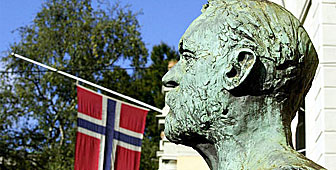Cancer cell pioneers share Nobel medicine prize

Two British scientists and an American have won the 2001 Nobel Prize for Medicine for their discoveries about the way cells work. Their research may eventually lead to new treatments for cancer and other diseases.
Leland Hartwell of the United States and Britons Tim Hunt and Paul Nurse, have spent years investigating how cells reproduce in a bid to understand and halt the uncontrolled growth which characterises cancer.
The last Swiss winner of the prize was Rolf Zinkernagel in 1996. Since 1901, Switzerland has had more Nobel Prize winners per capita than any other country in the world.
“It’s partly a question of the resources poured into particular disciplines of scientific research at any given time,” said sociologist, Ariane Miéville, who, at Lausanne University, co-authored a study on the Swiss Nobel prize winners.
“Then there are historical reasons. Switzerland has traditionally been a place of refuge where scientists could find an island of stability to conduct their research even when they were persecuted in their own countries. Some of them later acquired citizenship.
“Finally, Swiss scientists are well integrated in the international scientific community. Before World War Two, they had good relations with German scientists, and Germany was renowned for its science.
“Since 1945, the Swiss have been in the American zone of influence, so to speak. The Americans, of course, have the highest number of Nobel Prize winners in total, and there has been lots of interaction and exchange.”
Einstein’s origins
Compiling national lists of Nobel Prize winners is no easy task. Albert Einstein, who received the physics prize in 1921 had three nationalities.
Wolfgang Pauli, who won the physics prize in 1945 was an Austrian Jew, who spent most of his career at the Federal Institute of Technology in Lausanne but only obtained Swiss citizenship after winning the prize. Daniel Bovet (medicine, 1957), was born and educated in Neuchatel but pursued his career in Italy.
Miéville and her co-author, Isabelle Honorez, finally settled on two categories. In the first, they placed scientists who were born and largely educated in Switzerland even if their professional career was abroad. The second consists of foreigners who spent all or part of their career here and acquired Swiss nationality.
Their final tally for the three scientific disciplines – physics, chemistry and medicine – is 18 names.
The awarding of Nobel prizes has occasionally generated controversy. Einstein was nominated on several occasions. When he finally won in 1921, it was for the discovery of the law of the photoelectric effect and not for his general theory of relativity.
In 1948, the Swiss chemist, Paul Müller was award the prize for medicine “for his discovery of the high efficiency of DDT as a contact poison against several arthropods” according to the official citation.
“At the time, it was seen as great benefit for mankind and the undesirable effects were not realised until later,” said Miéville.
Missing from the list
On the other hand, there are some notable omissions from the list of prize winners including the American, Thomas Edison, inventor of the electric lamp and the phonograph, and the Russian chemist, Dmitri Mendeleyev, who devised the periodic table of chemical elements.
In other disciplines, Switzerland has also fared well. Although no Swiss national has carried off the economics prize, the poet, Carl Spitteler in 1919 and Hermann Hesse in 1946, who was of German origin but acquired Swiss citizenship, have won the Nobel prize for literature.
Henri Dunant won the Nobel peace price in 1901 and that has subsequently been awarded on several occasions to the International Committee of the Red Cross and the Geneva-based United Nations refugee agency.
Nobel prizes are not only prestigious, they are also lucrative. Each Nobel prize this year will amount to more than SFr1.5 million
by Vincent Landon

In compliance with the JTI standards
More: SWI swissinfo.ch certified by the Journalism Trust Initiative
You can find an overview of ongoing debates with our journalists here . Please join us!
If you want to start a conversation about a topic raised in this article or want to report factual errors, email us at english@swissinfo.ch.